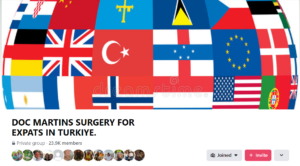Anyone who has visited Turkey will have not failed to notice that the driving standards are pretty poor. We have had many of our clients say they would never be able to drive in Turkey even though they are confident drivers back in the UK. It is daunting to drive in any foreign country due to different rules and regulations and especially driving on the right hand side of the road.
Most people move here with the idea that they will be happy to travel by dolmus (the local bus). However, once here the novelty soon wears off when the temperatures start to increase and the influx of summer tourists arrive. A dolmus journey in the height of the summer is not a pleasant experience! Factor in carrying bags of shopping and it really is not ideal. Taxi’s can be expensive if you need to use them on a regular basis and at times you can feel like you are on the set of fast and furious!
For most people that move here or spend longer amounts of time here, driving soon becomes a necessity. It is possible and it is not as daunting as it sounds but there are some things you need to consider which we have listed below:
1. Driving on the right hand side of the road
Driving on the right is not as difficult as it seems as when on the road the driver’s position is still exactly the same as when in the UK as the driver is sat on the left side of the car. It actually feels very normal once you get over the several attempts to enter the car from the passenger’s side. A good thing to keep in mind is the driver needs to always be nearer the middle of the road and not kerbside, unless you are driving a right hand drive vehicle from the UK!
2. Be very aware of other drivers
We can’t stress this enough, you really need to act like you have just passed your test and you’re as alert as possible. This means no daydreaming and driving defensively! Assume at every crossroad or side road that another vehicle will pull out in front of you, as we promise you it will happen! Have your foot hovering the brake at all times. You also need to be very careful of motorcycles as there are lots and lots on the roads in Turkey. They sneak up on you in the blink of an eye. You really need to check over your shoulder and check again when making any turns. Also, make sure you do a good check over your shoulder before opening your car door when parked!
3. Traffic police and jandarma roadside checks
There are places where the traffic police or jandarma are situated permanently and they also set up random checkpoints. Don’t panic if stopped as mostly it is purley a routine identity and vehicle check. It is advisable to always have your car insurance, vehicle inspection report (TÜVTÜRK araç muayene raporu – similar to an MOT certificate), driving licence, passport and residency (if you have) on you at all times as these documents could be asked for if you are stopped.
4. M plate
If a foreigner purchases a car in Turkey they will be issued with a registration plate that includes the letter M, this stands for misafir which means guest . The first 2 numbers of a registration plate in Turkey identifies the province in which the car is registered, for example 48 is the number for Mugla so all cars registered in Fethiye will start with the number 48. This is actually a useful way of identifying drivers from out of town. If a foreigner owns a car that is registered in Fethiye it will start with 48 M, other letters will follow the M.
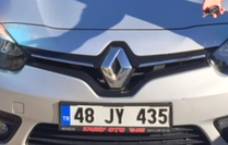
Example of Fethiye number plate registered to a Turkish owner
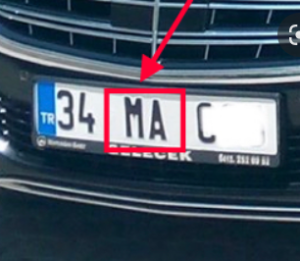
Example of an Istanbul number plate registered to a foreigner
5. Roundabouts
The rules of roundabouts are not the same as in the UK, in general the right of way goes to those already driving around the circle but this is not always the case. Look out for the ‘Dur’ (stop) signs or traffic lights as you go round the circle as it’s not uncommon to have to stop to give way to vehicles entering from the ‘main’ road. Unless you are local it can be hard to know which road is classed as the main road so an important word all drivers need to know is ‘Dur’. Dur will also help you know whose right of way it is at cross roads, by the way there are lots of them in Turkey and lots of accidents at them too!
6. Insurance
Insurance for foreigners is different from the insurance for Turkish citizens. For Turkish citizens the car is insured and anyone with a valid driving licence is covered by the insurance. For non-Turkish citizens the driver is insured for the M plate vehicle and only their immediate family members with a valid drivers licence are covered, for example the driver’s spouse and children. You can have different levels of insurance just like the UK has e.g. fully comprehensive and third party. We always recommend to our clients using a well known insurance broker in Fethiye called Cagri Nebioglu, he is the owner at Insurance Turkey and specialises in all types of insurance for expats, please click here to visit his website.
https://www.insuranceturkey.com/
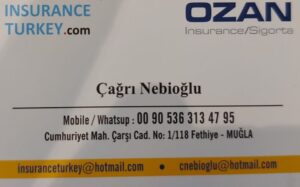
7. Driving on a UK driving licence
Visitors that hold a valid UK driving licence can drive in Turkey for up to 6 months. If you spend longer than 6 months here there is a current loop hole which means if you exit the country and re-enter to obtain a new entrance stamp in your passport the 6 months starts again.
Drivers with a valid UK driving licence are able to exchange their UK driving licence for a Turkish one and this does not require sitting a Turkish driving test. But this does require relinquishing your UK driving licence. The Turkish authorities will return it to the DVLA in the UK and you can request for it to be reinstated should you ever return to live in the UK. As you can imagine lots of residents are not keen on this idea and most prefer to do a quick trip to Rhodes or Meis, locally this is known as the driving licence run!
If you do want to apply for a Turkish driving licence we highly recommend using Gurkan Gurol who is an official sworn translator in Fethiye that offers consultancy services to expats, click here to find him on facebook.
https://www.facebook.com/gurkan.gurol.5
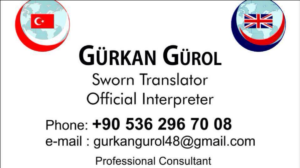
As with everything the rules and regulations can change so it is important to always stay up to date with the current requirements, a great source for up to date information on this topic and lots of others is a Facebook group called Doc Martins Surgery for Expats in Turkiye – click here to join the group. https://www.facebook.com/groups/544167955696716
